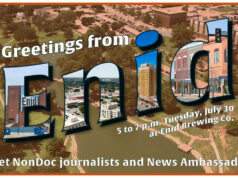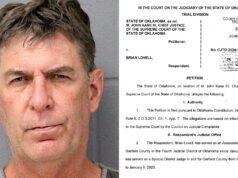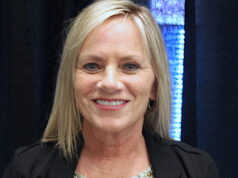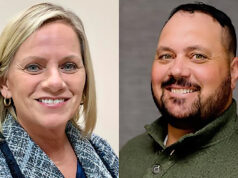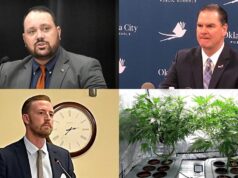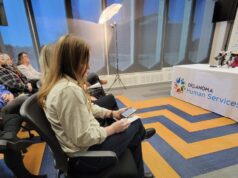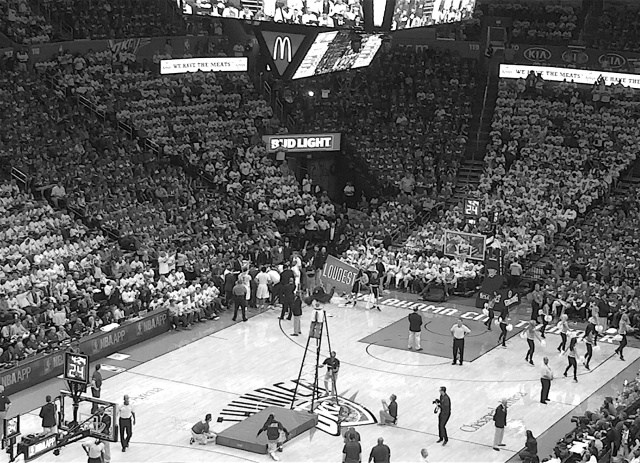
The popularity of basketball in OKC mirrors this city’s growth. The sport has, in a way, rewritten history on an individual level. The fabric of people’s past now has hoops awkwardly stitched into to it. We’ve been built to love the game, and it’s always been this way, albeit in an Orwellian newspeak sort of fashion.
(Who’s Gary Payton? What’s Seattle?)
The basketball Mecca built in a day
It doesn’t seem to matter where I am in central Oklahoma, everyone I come across is now a basketball analyst in the same way the drunkest redneck at a tailgate is OU football’s next defensive coordinator.
The OKC Thunder have been such an elite team for so long that, as fans, we wear the distinction naturally. It’s as if we grew up in a basketball Mecca; an Indiana where country kids shoot in driveways until they’re sunburnt; a Chicago where drunkards enthusiastically debate the last game until their friends have to carry them out of the bar.
It’s been pretty awesome to see, especially considering how little basketball used to define public life in Oklahoma. (Does anybody remember when the And1 Street Ball Tour came through and a member said we had the worst ballers in the country?)
‘Get out of here, fatty!’
My love of basketball is rooted in Kelvin Sampson-era OU men’s basketball, Jordan’s Bulls, every Eastern conference team that valiantly took on Shaq/Kobe’s Lakers and those Street Ball legends that tricked the internet into imitating them.
But I also grew up loving something else: Oklahoma City minor league sports. Do you remember the OKC Cavalry from the CBA? I do. They played in mostly empty arenas and on AM radio. They were champions, even.
Sorry, I talk about minor league sports the same way Pitchfork music writers talk about hot indie bands: You probably never heard of them.
Still, the first professional basketball game I ever went to was an Oklahoma Storm game in OKC. The Storm were actually based in Enid, and NBA all-time scoring leader Kareem Abdul-Jabbar moved there to coach. And by “coach” I mean he sat on the bench emotionless with red eyes, looking mega high while the suited dude next him barked out instructions to players.
At that game, I remember former NBA player Oliver Miller was on the opposing team. Miller, if you don’t remember, was a talented Arkansas product who once held the Toronto Raptors single-game record for blocks with nine. But Miller struggled with his weight and eventually ate himself out of the league.
At the Oklahoma Storm game, I remember two little boys screaming at him: “Get out of here, fatty! Yo! Look at the fatty!”
They did not know who he was, and they showed no respect for a man who had touched greatness, if only for a brief second.
Yep. That was professional basketball in Oklahoma during the early 2000s.
To the big leagues … in another state
A year or so later, my brother got me tickets to my first NBA game: Iverson and the 76ers were taking on Dirk and the Mavericks. I was stoked, until we got to Dallas and learned The Answer was hurt.
Erick Dampier grabbed 26 boards that night, so it was still kind of worth it, but it’s not a story I could talk to anyone about back home. Just like every dunk contest where Lebron doesn’t compete, there was no sizzle to discuss.
Then, Hurricane Katrina happened. In the hurricane’s wake, many were displaced, and lives were turned upside down. The energy in Oklahoma shuffled around in turn:
- We got Cajun King (a phenomenal fried feast of a buffet).
- The New Orleans Hornets moved in as well.
As the result of such an American tragedy, Chris Paul and the Hornets changed how Oklahoma City viewed basketball. They changed how this city viewed itself.
Prior, talking heads would speak of major league cities. I never knew what that meant. Back then, I couldn’t even fathom what it implied. It was like wolves howling at the moon. Why bother? It’s too far away, something never to be touched.
But the Hornets were here. And they were successful. And suddenly, the entire city believed. The players that you only saw on TV could be seen up close now.
Like, really close.
Naked men and grandiose claims
At the first Hornets game I went to, I definitely saw backup point guard Bobby Jackson naked. I was studying journalism at the time, and one of my classmates gave me his media pass to cover a game, so I wandered around with it. Back in the day, I was just a kid who wanted to watch Iverson play. Instead, I got giant, naked Bobby Jackson towering over me, and I remember asking Chris Paul a dumb question. I also saw Tyson Chandler up close and became terrified at how skinny he actually was.
That experience coincided with what I consider to be a weird transitional period for Oklahoma’s basketball worldview. At the time, everybody suddenly liked basketball. Even if they hadn’t before, they were going to fake it anyway. I remember being in a smoke-filled country bar where my friend was working, and I listened to two gentlemen talking about a Maverick’s game.
“Dirk,” one man said. “I truly think he’s the best basketball player to ever play the game. Even better than Bird.”
Dirk? I remember being puzzled. He’s good. He may even be pretty great, but only in that bar, in that instance, would anybody say he was the greatest ever. It was the only time I’d ever heard it. Then, on a fast break, one of them enthusiastically screamed, “Run boy!”
It made me really uncomfortable.
“What the hell is happening?” I thought. “Also, this asshole just started watching basketball. These two don’t even know what they’re watching.”
Now, basketball is ‘part of the city’
Look at us now, though. Basketball is part of our culture in Oklahoma, and Thunder players are part of the city.
I’ve seen Nick Collison find his friends at a pizza place after a game, look up to see the Rockets playing and talk about how good James Harden is.
I’ve seen Russell Westbrook in a diner with his hoodie up, politely taking pictures with customers while trying to grab his chicken and waffles to go so he can eat quietly in peace.
I’m not one for hero worship, but basketball’s star-studded presence in my hometown is a lot better than having people freak out every time Wayne Coyne shows up at a Braum’s.
Now, international superstars show up at Braum’s to scoop ice cream.
Everybody needs heroes, and over the past 20 years I’ve seen Oklahoma’s basketball heroes progress from Ryan Minor and Voshon Lenard to Kevin Durant and Russell Westbrook.
We’ve come a long way. So win or lose this year, it’s been awesome to watch.










